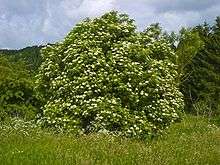Definify.com
Webster 1913 Edition
Elder
El′der
,Webster 1828 Edition
Elder
EL'DER
,Definition 2026
Elder
elder
elder
English
Adjective
elder
- Comparative of old: older, greater than another in age or seniority.
- The elder of the two was also an elder statesman
- 1913, Robert Barr, chapter 5, in Lord Stranleigh Abroad:
- She removed Stranleigh’s coat with a dexterity that aroused his imagination. The elder woman returned with dressings and a sponge, which she placed on a chair.
Usage notes
The normal comparative of old is older. The irregular form elder is sometimes used with family members, but otherwise rare (except in fixed expressions such as elder statesman). Elder is generally limited to attributive position (my elder brother) and does not occur in predicative position (*my brother is elder).
Translations
|
|
Noun
elder (plural elders)
- An older person or an older member, usually a leader, of some community.
- We were presented to the village elder.
- One who is older than another.
- Respect your elders.
- One who lived at an earlier period; a predecessor.
- L'Estrange
- Carry your head as your elders have done.
- L'Estrange
- An officer of a church, sometimes having teaching responsibilities.
- A clergyman authorized to administer all the sacraments.
- a travelling elder
- (US, Mormonism) One ordained to the lowest office in the Melchizedek priesthood.
- After being a member of the Church for a while, Bill was ordained to the office of elder.
- Jack had been an elder for only a few days when he received a new calling.
- (US, Mormonism) Male missionary.
- The elders are coming over for dinner tonight.
- (Mormonism, often capitalized) Title for a male missionary; title for a general authority.
- One of the long-time leaders in the Church is Elder Packer.
- (paganism and Heathenry) A pagan or Heathen priest or priestess.
Translations
|
|
Verb
elder (third-person singular simple present elders, present participle eldering, simple past and past participle eldered)
- (Quakerism) To admonish or reprove for improper conduct by the elders of the meeting.
- I was eldered for directly responding to someone else's message in meeting for worship.
Derived terms
|
Etymology 2

From Middle English eldre, eller, from Old English ellærn, from Proto-Germanic *el(d)ernaz (confer Low German Elhorn, Elloorn), adjectival from Proto-Indo-European *h₁edʰ-l-i 'spruce, fir' (compare Middle Irish aidlen 'silver fir', Latin ebulum (“dwarf elder”), Old Prussian addle 'fir', Czech jedle 'silver fir', Ancient Greek ἐλάτη (elátē, “silver fir”)
Noun
elder (plural elders)
- A small tree, Sambucus nigra, having white flowers in a cluster, and edible purple berries
- Any of the other species of the genus Sambucus: small trees, shrubs or herbaceous perennials with red, purple, or white/yellow berries (some of which are poisonous).
Synonyms
- (Sambucus nigra): black elder
Derived terms
|
Translations
|
|
|
Old Swedish
Etymology
From Old Norse eldr, from Proto-Germanic *ailidaz.
Noun
elder m
- fire
- a skin disease - possibly erysipelas
Declension
Descendants
- Swedish: eld